HI6025, T3 2019: Adoption of IFRS - Critical Review Report
VerifiedAdded on 2022/08/27
|18
|4340
|33
Report
AI Summary
This report presents a critical review of the adoption of International Financial Reporting Standards (IFRS), focusing on its relevance to Australian reporting entities and the application of Positive Accounting Theory (PAT). The study includes a comparative analysis of IFRS implementation in Australia and Korea, examining the reasons for adoption, transitional challenges, and the benefits and challenges faced by reporting entities in both countries. The report highlights the similarities and differences in the IFRS adoption processes of the two countries. Furthermore, it evaluates the success of IFRS adoption and provides recommendations for accounting standard-setting bodies to facilitate future adoption and address user needs. The analysis covers the impact of accounting choices, political costs, and the importance of financial reporting transparency, offering a comprehensive overview of the subject.
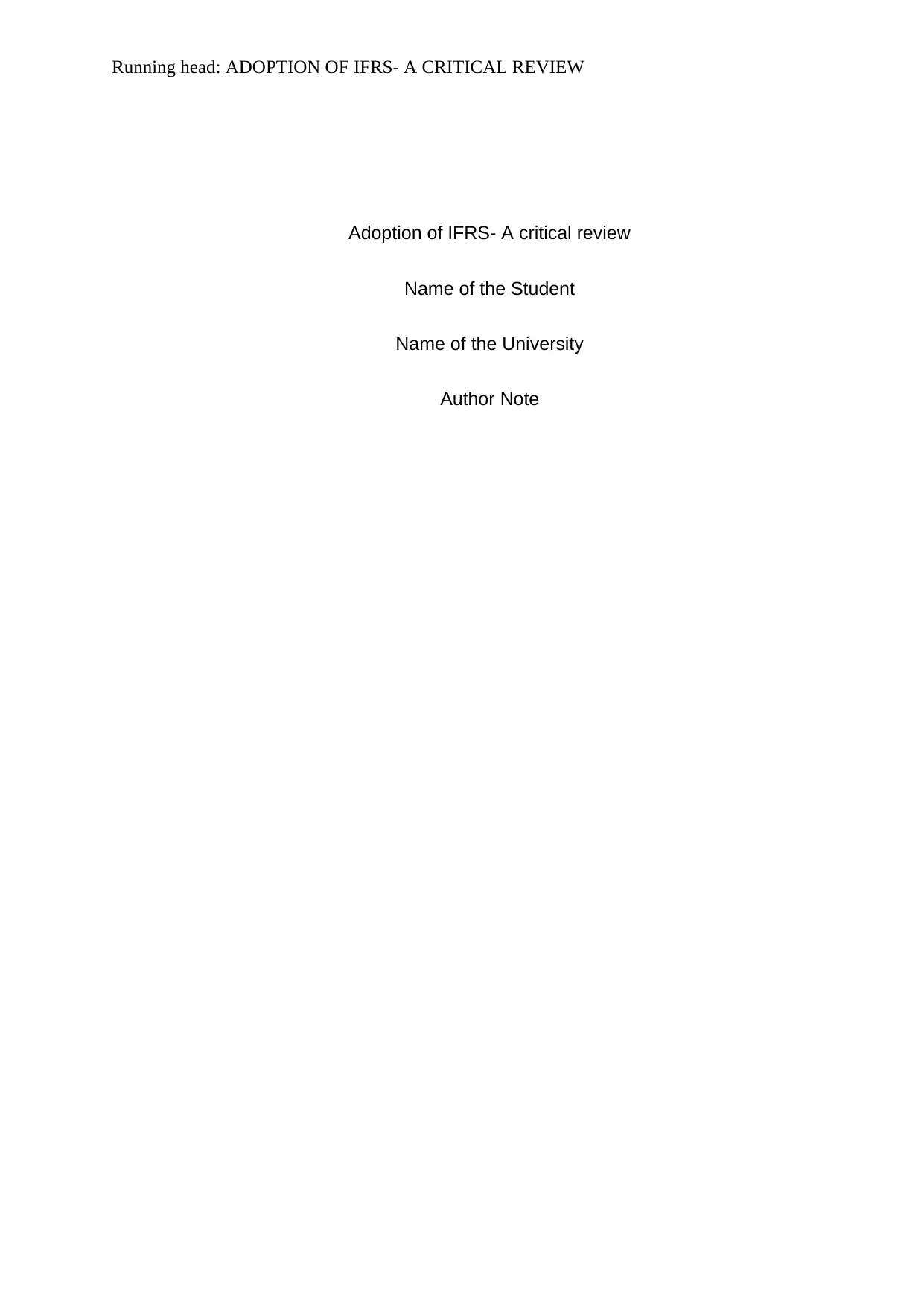
Running head: ADOPTION OF IFRS- A CRITICAL REVIEW
Adoption of IFRS- A critical review
Name of the Student
Name of the University
Author Note
Adoption of IFRS- A critical review
Name of the Student
Name of the University
Author Note
Paraphrase This Document
Need a fresh take? Get an instant paraphrase of this document with our AI Paraphraser
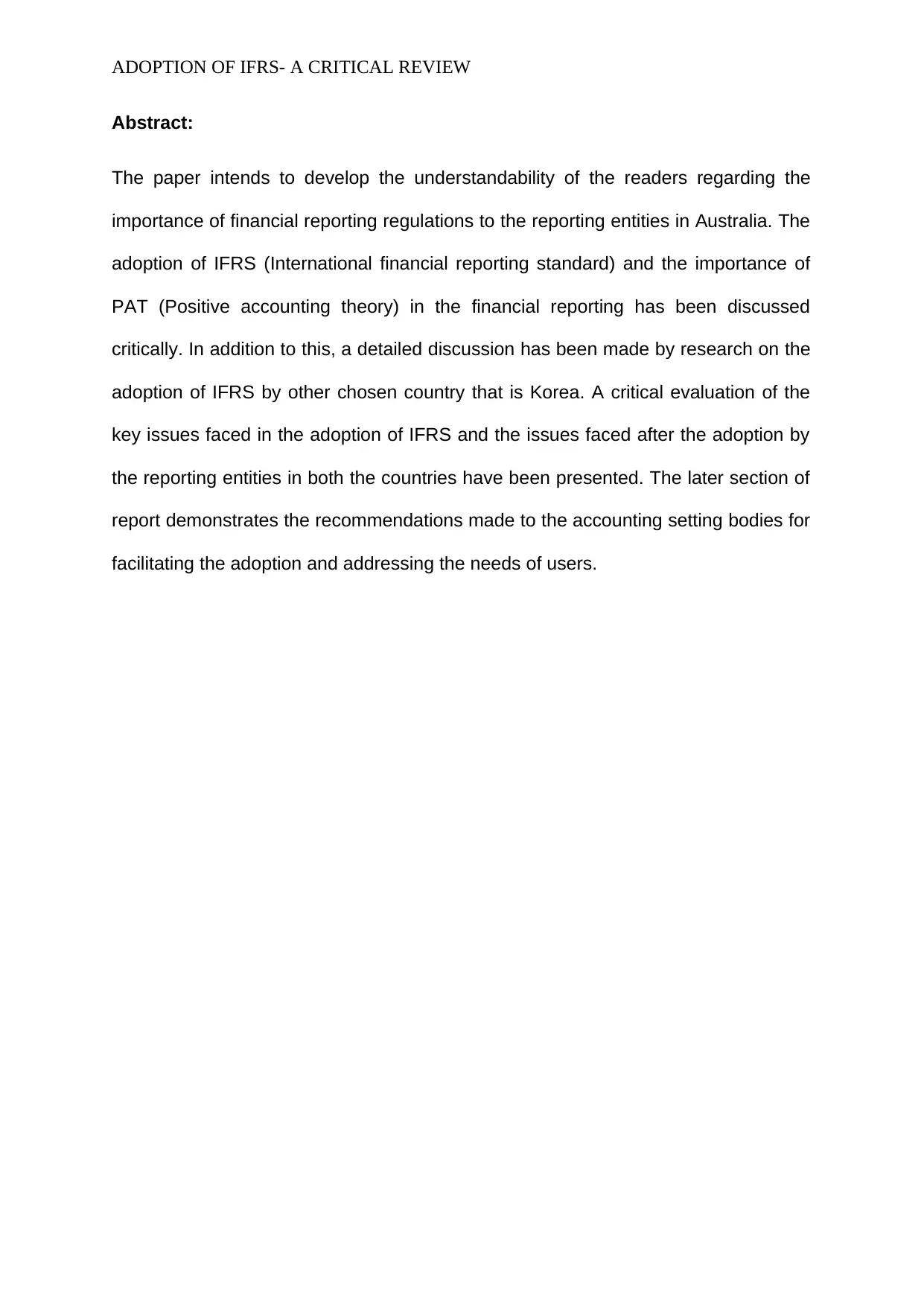
ADOPTION OF IFRS- A CRITICAL REVIEW
Abstract:
The paper intends to develop the understandability of the readers regarding the
importance of financial reporting regulations to the reporting entities in Australia. The
adoption of IFRS (International financial reporting standard) and the importance of
PAT (Positive accounting theory) in the financial reporting has been discussed
critically. In addition to this, a detailed discussion has been made by research on the
adoption of IFRS by other chosen country that is Korea. A critical evaluation of the
key issues faced in the adoption of IFRS and the issues faced after the adoption by
the reporting entities in both the countries have been presented. The later section of
report demonstrates the recommendations made to the accounting setting bodies for
facilitating the adoption and addressing the needs of users.
Abstract:
The paper intends to develop the understandability of the readers regarding the
importance of financial reporting regulations to the reporting entities in Australia. The
adoption of IFRS (International financial reporting standard) and the importance of
PAT (Positive accounting theory) in the financial reporting has been discussed
critically. In addition to this, a detailed discussion has been made by research on the
adoption of IFRS by other chosen country that is Korea. A critical evaluation of the
key issues faced in the adoption of IFRS and the issues faced after the adoption by
the reporting entities in both the countries have been presented. The later section of
report demonstrates the recommendations made to the accounting setting bodies for
facilitating the adoption and addressing the needs of users.
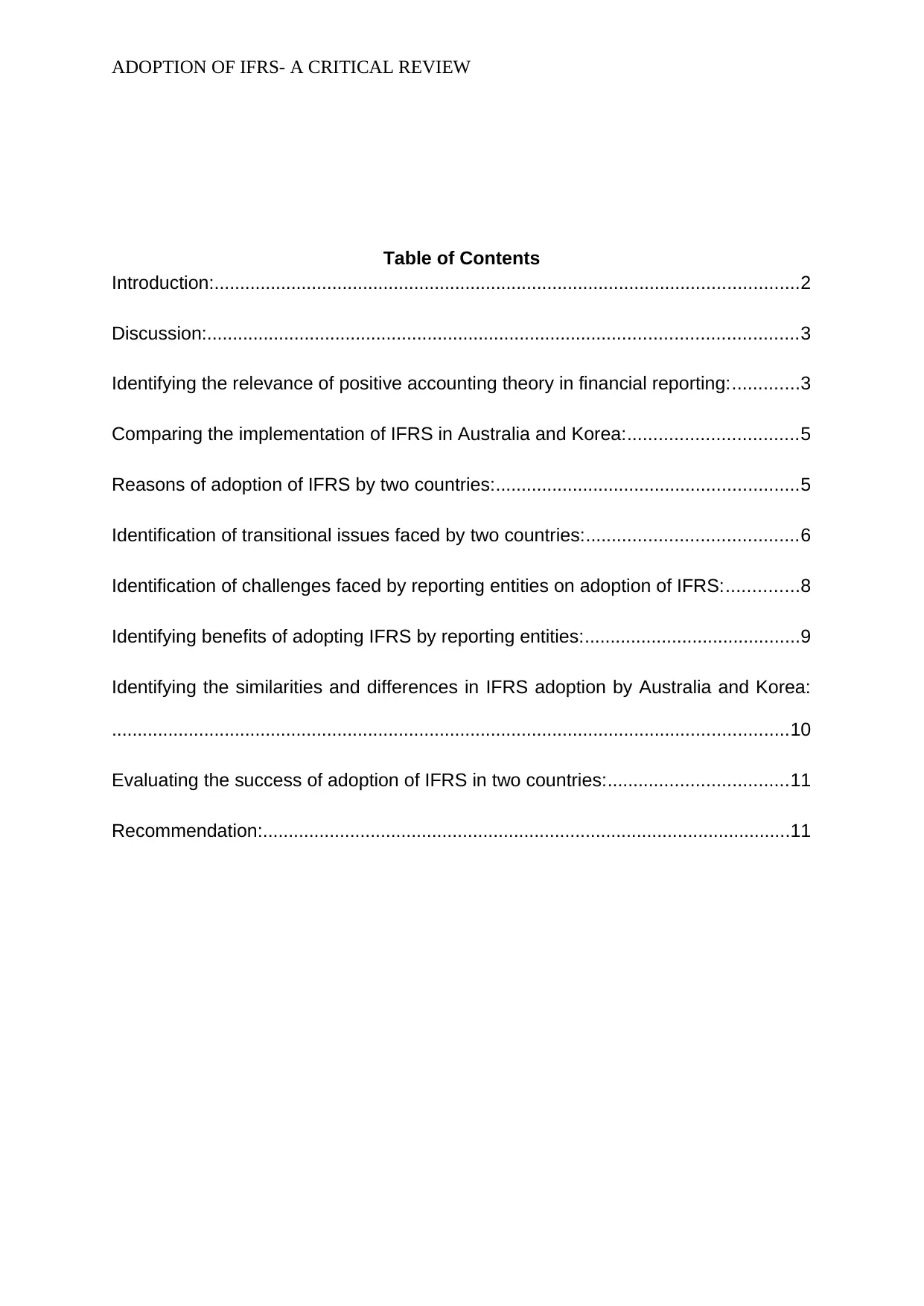
ADOPTION OF IFRS- A CRITICAL REVIEW
Table of Contents
Introduction:..................................................................................................................2
Discussion:...................................................................................................................3
Identifying the relevance of positive accounting theory in financial reporting:.............3
Comparing the implementation of IFRS in Australia and Korea:.................................5
Reasons of adoption of IFRS by two countries:...........................................................5
Identification of transitional issues faced by two countries:.........................................6
Identification of challenges faced by reporting entities on adoption of IFRS:..............8
Identifying benefits of adopting IFRS by reporting entities:..........................................9
Identifying the similarities and differences in IFRS adoption by Australia and Korea:
....................................................................................................................................10
Evaluating the success of adoption of IFRS in two countries:...................................11
Recommendation:.......................................................................................................11
Table of Contents
Introduction:..................................................................................................................2
Discussion:...................................................................................................................3
Identifying the relevance of positive accounting theory in financial reporting:.............3
Comparing the implementation of IFRS in Australia and Korea:.................................5
Reasons of adoption of IFRS by two countries:...........................................................5
Identification of transitional issues faced by two countries:.........................................6
Identification of challenges faced by reporting entities on adoption of IFRS:..............8
Identifying benefits of adopting IFRS by reporting entities:..........................................9
Identifying the similarities and differences in IFRS adoption by Australia and Korea:
....................................................................................................................................10
Evaluating the success of adoption of IFRS in two countries:...................................11
Recommendation:.......................................................................................................11
⊘ This is a preview!⊘
Do you want full access?
Subscribe today to unlock all pages.

Trusted by 1+ million students worldwide
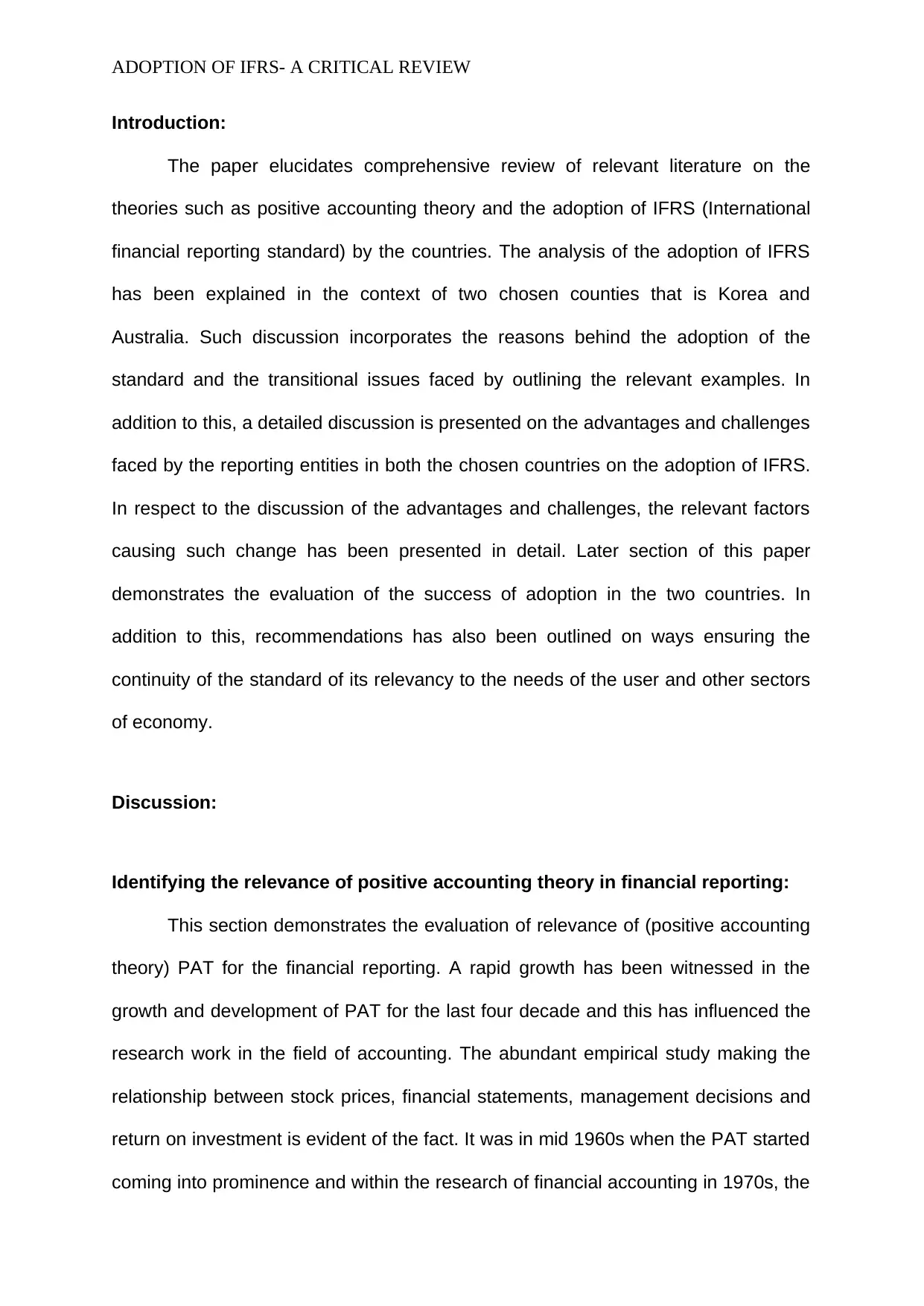
ADOPTION OF IFRS- A CRITICAL REVIEW
Introduction:
The paper elucidates comprehensive review of relevant literature on the
theories such as positive accounting theory and the adoption of IFRS (International
financial reporting standard) by the countries. The analysis of the adoption of IFRS
has been explained in the context of two chosen counties that is Korea and
Australia. Such discussion incorporates the reasons behind the adoption of the
standard and the transitional issues faced by outlining the relevant examples. In
addition to this, a detailed discussion is presented on the advantages and challenges
faced by the reporting entities in both the chosen countries on the adoption of IFRS.
In respect to the discussion of the advantages and challenges, the relevant factors
causing such change has been presented in detail. Later section of this paper
demonstrates the evaluation of the success of adoption in the two countries. In
addition to this, recommendations has also been outlined on ways ensuring the
continuity of the standard of its relevancy to the needs of the user and other sectors
of economy.
Discussion:
Identifying the relevance of positive accounting theory in financial reporting:
This section demonstrates the evaluation of relevance of (positive accounting
theory) PAT for the financial reporting. A rapid growth has been witnessed in the
growth and development of PAT for the last four decade and this has influenced the
research work in the field of accounting. The abundant empirical study making the
relationship between stock prices, financial statements, management decisions and
return on investment is evident of the fact. It was in mid 1960s when the PAT started
coming into prominence and within the research of financial accounting in 1970s, the
Introduction:
The paper elucidates comprehensive review of relevant literature on the
theories such as positive accounting theory and the adoption of IFRS (International
financial reporting standard) by the countries. The analysis of the adoption of IFRS
has been explained in the context of two chosen counties that is Korea and
Australia. Such discussion incorporates the reasons behind the adoption of the
standard and the transitional issues faced by outlining the relevant examples. In
addition to this, a detailed discussion is presented on the advantages and challenges
faced by the reporting entities in both the chosen countries on the adoption of IFRS.
In respect to the discussion of the advantages and challenges, the relevant factors
causing such change has been presented in detail. Later section of this paper
demonstrates the evaluation of the success of adoption in the two countries. In
addition to this, recommendations has also been outlined on ways ensuring the
continuity of the standard of its relevancy to the needs of the user and other sectors
of economy.
Discussion:
Identifying the relevance of positive accounting theory in financial reporting:
This section demonstrates the evaluation of relevance of (positive accounting
theory) PAT for the financial reporting. A rapid growth has been witnessed in the
growth and development of PAT for the last four decade and this has influenced the
research work in the field of accounting. The abundant empirical study making the
relationship between stock prices, financial statements, management decisions and
return on investment is evident of the fact. It was in mid 1960s when the PAT started
coming into prominence and within the research of financial accounting in 1970s, the
Paraphrase This Document
Need a fresh take? Get an instant paraphrase of this document with our AI Paraphraser
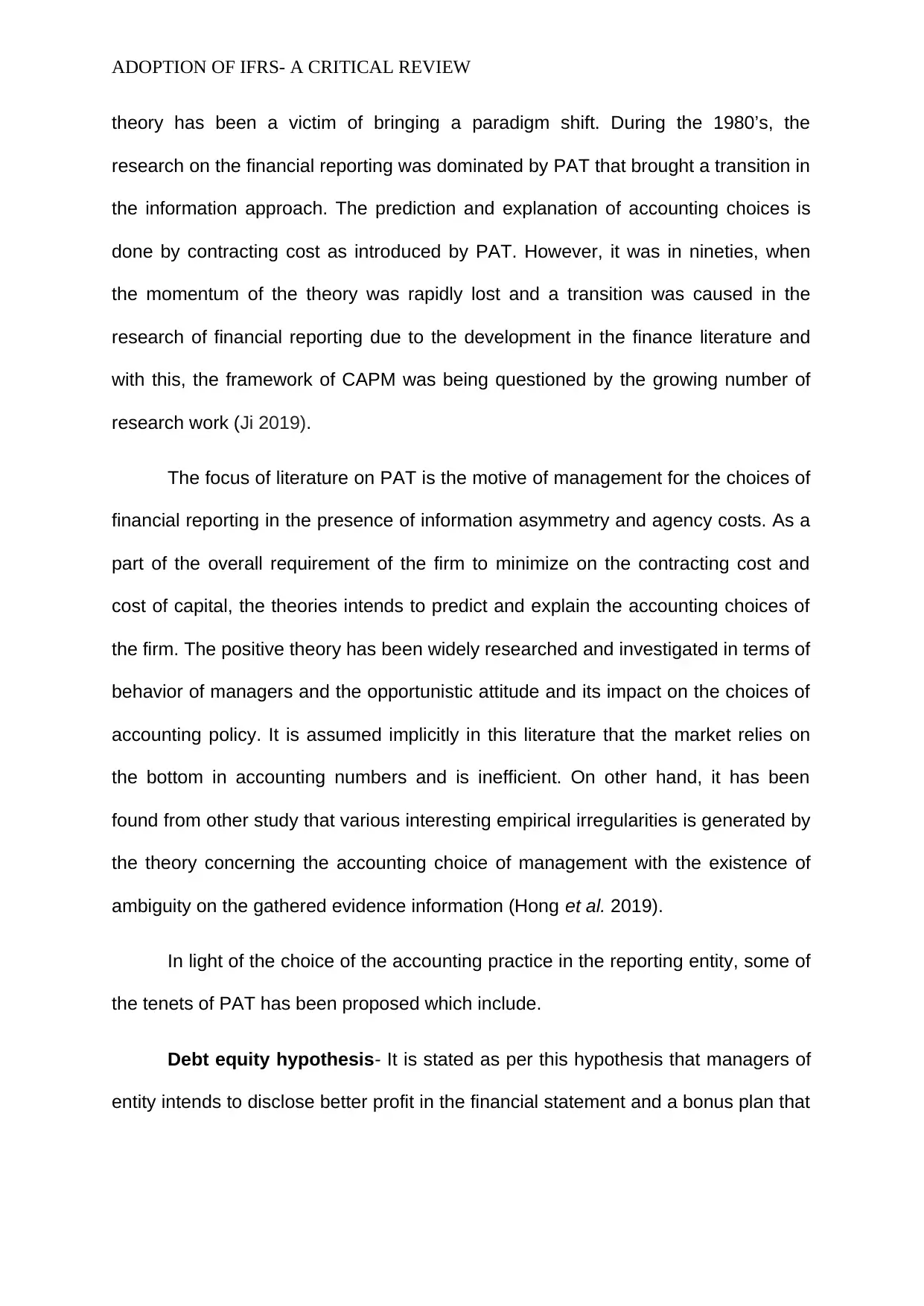
ADOPTION OF IFRS- A CRITICAL REVIEW
theory has been a victim of bringing a paradigm shift. During the 1980’s, the
research on the financial reporting was dominated by PAT that brought a transition in
the information approach. The prediction and explanation of accounting choices is
done by contracting cost as introduced by PAT. However, it was in nineties, when
the momentum of the theory was rapidly lost and a transition was caused in the
research of financial reporting due to the development in the finance literature and
with this, the framework of CAPM was being questioned by the growing number of
research work (Ji 2019).
The focus of literature on PAT is the motive of management for the choices of
financial reporting in the presence of information asymmetry and agency costs. As a
part of the overall requirement of the firm to minimize on the contracting cost and
cost of capital, the theories intends to predict and explain the accounting choices of
the firm. The positive theory has been widely researched and investigated in terms of
behavior of managers and the opportunistic attitude and its impact on the choices of
accounting policy. It is assumed implicitly in this literature that the market relies on
the bottom in accounting numbers and is inefficient. On other hand, it has been
found from other study that various interesting empirical irregularities is generated by
the theory concerning the accounting choice of management with the existence of
ambiguity on the gathered evidence information (Hong et al. 2019).
In light of the choice of the accounting practice in the reporting entity, some of
the tenets of PAT has been proposed which include.
Debt equity hypothesis- It is stated as per this hypothesis that managers of
entity intends to disclose better profit in the financial statement and a bonus plan that
theory has been a victim of bringing a paradigm shift. During the 1980’s, the
research on the financial reporting was dominated by PAT that brought a transition in
the information approach. The prediction and explanation of accounting choices is
done by contracting cost as introduced by PAT. However, it was in nineties, when
the momentum of the theory was rapidly lost and a transition was caused in the
research of financial reporting due to the development in the finance literature and
with this, the framework of CAPM was being questioned by the growing number of
research work (Ji 2019).
The focus of literature on PAT is the motive of management for the choices of
financial reporting in the presence of information asymmetry and agency costs. As a
part of the overall requirement of the firm to minimize on the contracting cost and
cost of capital, the theories intends to predict and explain the accounting choices of
the firm. The positive theory has been widely researched and investigated in terms of
behavior of managers and the opportunistic attitude and its impact on the choices of
accounting policy. It is assumed implicitly in this literature that the market relies on
the bottom in accounting numbers and is inefficient. On other hand, it has been
found from other study that various interesting empirical irregularities is generated by
the theory concerning the accounting choice of management with the existence of
ambiguity on the gathered evidence information (Hong et al. 2019).
In light of the choice of the accounting practice in the reporting entity, some of
the tenets of PAT has been proposed which include.
Debt equity hypothesis- It is stated as per this hypothesis that managers of
entity intends to disclose better profit in the financial statement and a bonus plan that
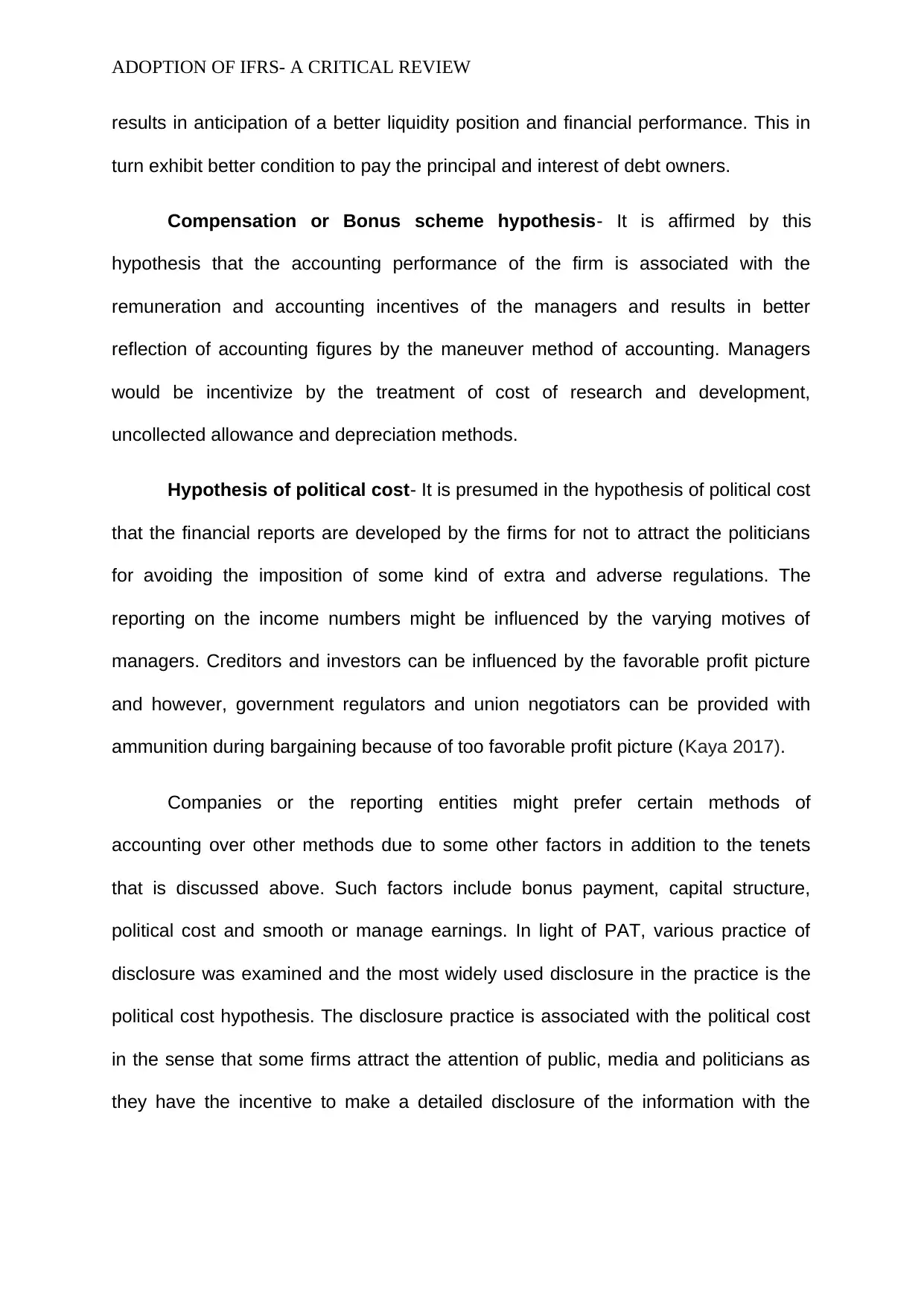
ADOPTION OF IFRS- A CRITICAL REVIEW
results in anticipation of a better liquidity position and financial performance. This in
turn exhibit better condition to pay the principal and interest of debt owners.
Compensation or Bonus scheme hypothesis- It is affirmed by this
hypothesis that the accounting performance of the firm is associated with the
remuneration and accounting incentives of the managers and results in better
reflection of accounting figures by the maneuver method of accounting. Managers
would be incentivize by the treatment of cost of research and development,
uncollected allowance and depreciation methods.
Hypothesis of political cost- It is presumed in the hypothesis of political cost
that the financial reports are developed by the firms for not to attract the politicians
for avoiding the imposition of some kind of extra and adverse regulations. The
reporting on the income numbers might be influenced by the varying motives of
managers. Creditors and investors can be influenced by the favorable profit picture
and however, government regulators and union negotiators can be provided with
ammunition during bargaining because of too favorable profit picture (Kaya 2017).
Companies or the reporting entities might prefer certain methods of
accounting over other methods due to some other factors in addition to the tenets
that is discussed above. Such factors include bonus payment, capital structure,
political cost and smooth or manage earnings. In light of PAT, various practice of
disclosure was examined and the most widely used disclosure in the practice is the
political cost hypothesis. The disclosure practice is associated with the political cost
in the sense that some firms attract the attention of public, media and politicians as
they have the incentive to make a detailed disclosure of the information with the
results in anticipation of a better liquidity position and financial performance. This in
turn exhibit better condition to pay the principal and interest of debt owners.
Compensation or Bonus scheme hypothesis- It is affirmed by this
hypothesis that the accounting performance of the firm is associated with the
remuneration and accounting incentives of the managers and results in better
reflection of accounting figures by the maneuver method of accounting. Managers
would be incentivize by the treatment of cost of research and development,
uncollected allowance and depreciation methods.
Hypothesis of political cost- It is presumed in the hypothesis of political cost
that the financial reports are developed by the firms for not to attract the politicians
for avoiding the imposition of some kind of extra and adverse regulations. The
reporting on the income numbers might be influenced by the varying motives of
managers. Creditors and investors can be influenced by the favorable profit picture
and however, government regulators and union negotiators can be provided with
ammunition during bargaining because of too favorable profit picture (Kaya 2017).
Companies or the reporting entities might prefer certain methods of
accounting over other methods due to some other factors in addition to the tenets
that is discussed above. Such factors include bonus payment, capital structure,
political cost and smooth or manage earnings. In light of PAT, various practice of
disclosure was examined and the most widely used disclosure in the practice is the
political cost hypothesis. The disclosure practice is associated with the political cost
in the sense that some firms attract the attention of public, media and politicians as
they have the incentive to make a detailed disclosure of the information with the
⊘ This is a preview!⊘
Do you want full access?
Subscribe today to unlock all pages.

Trusted by 1+ million students worldwide
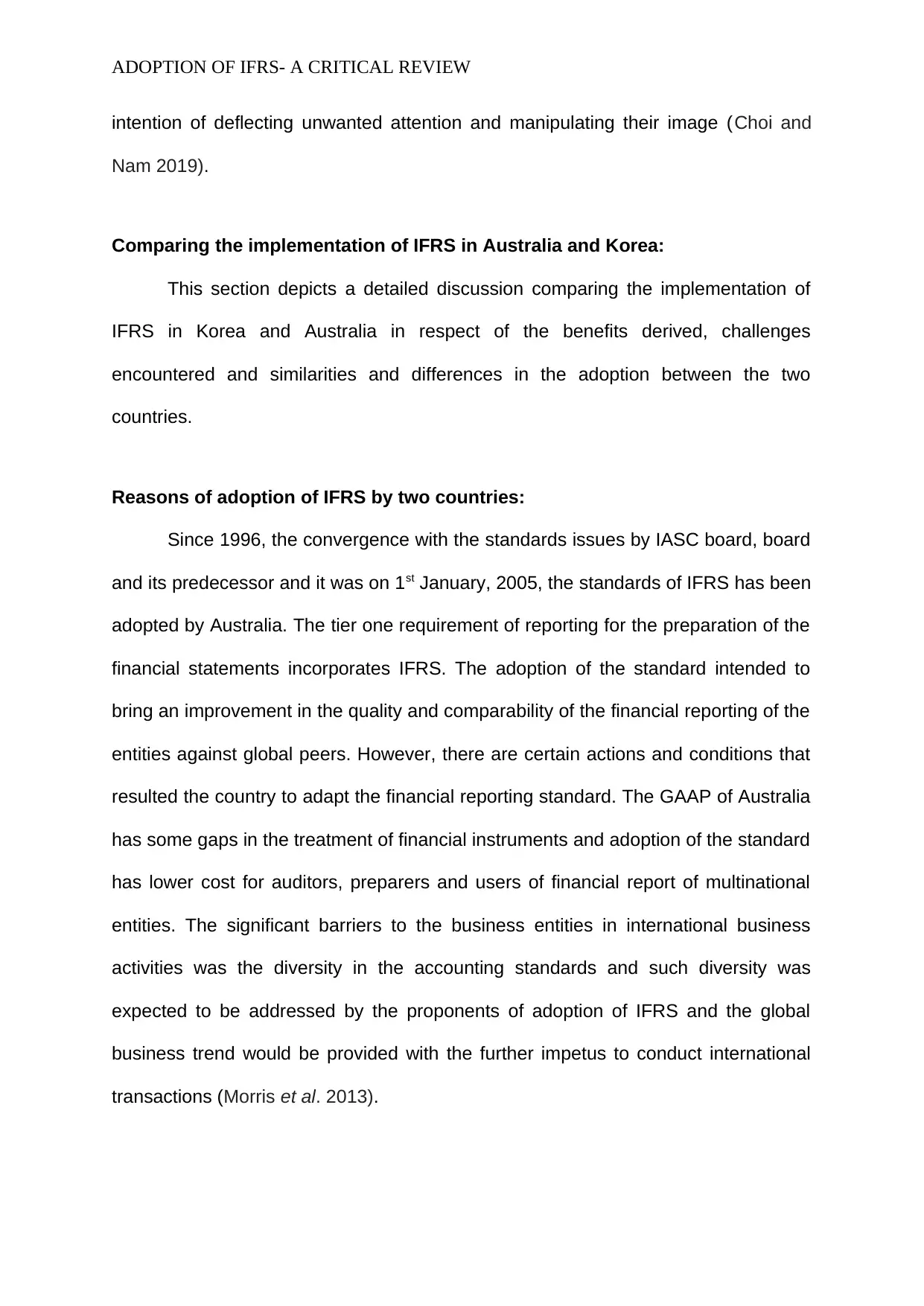
ADOPTION OF IFRS- A CRITICAL REVIEW
intention of deflecting unwanted attention and manipulating their image (Choi and
Nam 2019).
Comparing the implementation of IFRS in Australia and Korea:
This section depicts a detailed discussion comparing the implementation of
IFRS in Korea and Australia in respect of the benefits derived, challenges
encountered and similarities and differences in the adoption between the two
countries.
Reasons of adoption of IFRS by two countries:
Since 1996, the convergence with the standards issues by IASC board, board
and its predecessor and it was on 1st January, 2005, the standards of IFRS has been
adopted by Australia. The tier one requirement of reporting for the preparation of the
financial statements incorporates IFRS. The adoption of the standard intended to
bring an improvement in the quality and comparability of the financial reporting of the
entities against global peers. However, there are certain actions and conditions that
resulted the country to adapt the financial reporting standard. The GAAP of Australia
has some gaps in the treatment of financial instruments and adoption of the standard
has lower cost for auditors, preparers and users of financial report of multinational
entities. The significant barriers to the business entities in international business
activities was the diversity in the accounting standards and such diversity was
expected to be addressed by the proponents of adoption of IFRS and the global
business trend would be provided with the further impetus to conduct international
transactions (Morris et al. 2013).
intention of deflecting unwanted attention and manipulating their image (Choi and
Nam 2019).
Comparing the implementation of IFRS in Australia and Korea:
This section depicts a detailed discussion comparing the implementation of
IFRS in Korea and Australia in respect of the benefits derived, challenges
encountered and similarities and differences in the adoption between the two
countries.
Reasons of adoption of IFRS by two countries:
Since 1996, the convergence with the standards issues by IASC board, board
and its predecessor and it was on 1st January, 2005, the standards of IFRS has been
adopted by Australia. The tier one requirement of reporting for the preparation of the
financial statements incorporates IFRS. The adoption of the standard intended to
bring an improvement in the quality and comparability of the financial reporting of the
entities against global peers. However, there are certain actions and conditions that
resulted the country to adapt the financial reporting standard. The GAAP of Australia
has some gaps in the treatment of financial instruments and adoption of the standard
has lower cost for auditors, preparers and users of financial report of multinational
entities. The significant barriers to the business entities in international business
activities was the diversity in the accounting standards and such diversity was
expected to be addressed by the proponents of adoption of IFRS and the global
business trend would be provided with the further impetus to conduct international
transactions (Morris et al. 2013).
Paraphrase This Document
Need a fresh take? Get an instant paraphrase of this document with our AI Paraphraser
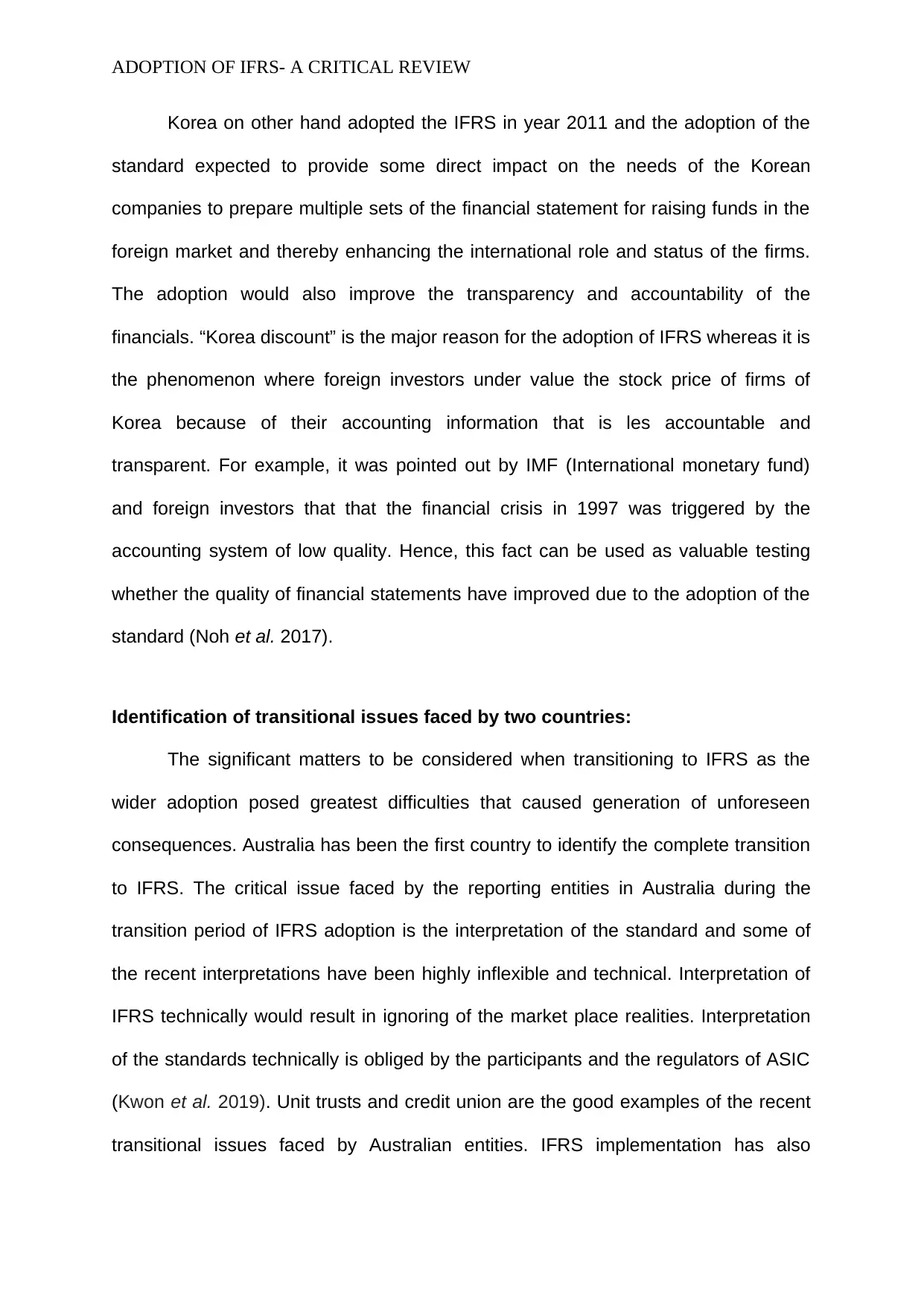
ADOPTION OF IFRS- A CRITICAL REVIEW
Korea on other hand adopted the IFRS in year 2011 and the adoption of the
standard expected to provide some direct impact on the needs of the Korean
companies to prepare multiple sets of the financial statement for raising funds in the
foreign market and thereby enhancing the international role and status of the firms.
The adoption would also improve the transparency and accountability of the
financials. “Korea discount” is the major reason for the adoption of IFRS whereas it is
the phenomenon where foreign investors under value the stock price of firms of
Korea because of their accounting information that is les accountable and
transparent. For example, it was pointed out by IMF (International monetary fund)
and foreign investors that that the financial crisis in 1997 was triggered by the
accounting system of low quality. Hence, this fact can be used as valuable testing
whether the quality of financial statements have improved due to the adoption of the
standard (Noh et al. 2017).
Identification of transitional issues faced by two countries:
The significant matters to be considered when transitioning to IFRS as the
wider adoption posed greatest difficulties that caused generation of unforeseen
consequences. Australia has been the first country to identify the complete transition
to IFRS. The critical issue faced by the reporting entities in Australia during the
transition period of IFRS adoption is the interpretation of the standard and some of
the recent interpretations have been highly inflexible and technical. Interpretation of
IFRS technically would result in ignoring of the market place realities. Interpretation
of the standards technically is obliged by the participants and the regulators of ASIC
(Kwon et al. 2019). Unit trusts and credit union are the good examples of the recent
transitional issues faced by Australian entities. IFRS implementation has also
Korea on other hand adopted the IFRS in year 2011 and the adoption of the
standard expected to provide some direct impact on the needs of the Korean
companies to prepare multiple sets of the financial statement for raising funds in the
foreign market and thereby enhancing the international role and status of the firms.
The adoption would also improve the transparency and accountability of the
financials. “Korea discount” is the major reason for the adoption of IFRS whereas it is
the phenomenon where foreign investors under value the stock price of firms of
Korea because of their accounting information that is les accountable and
transparent. For example, it was pointed out by IMF (International monetary fund)
and foreign investors that that the financial crisis in 1997 was triggered by the
accounting system of low quality. Hence, this fact can be used as valuable testing
whether the quality of financial statements have improved due to the adoption of the
standard (Noh et al. 2017).
Identification of transitional issues faced by two countries:
The significant matters to be considered when transitioning to IFRS as the
wider adoption posed greatest difficulties that caused generation of unforeseen
consequences. Australia has been the first country to identify the complete transition
to IFRS. The critical issue faced by the reporting entities in Australia during the
transition period of IFRS adoption is the interpretation of the standard and some of
the recent interpretations have been highly inflexible and technical. Interpretation of
IFRS technically would result in ignoring of the market place realities. Interpretation
of the standards technically is obliged by the participants and the regulators of ASIC
(Kwon et al. 2019). Unit trusts and credit union are the good examples of the recent
transitional issues faced by Australian entities. IFRS implementation has also
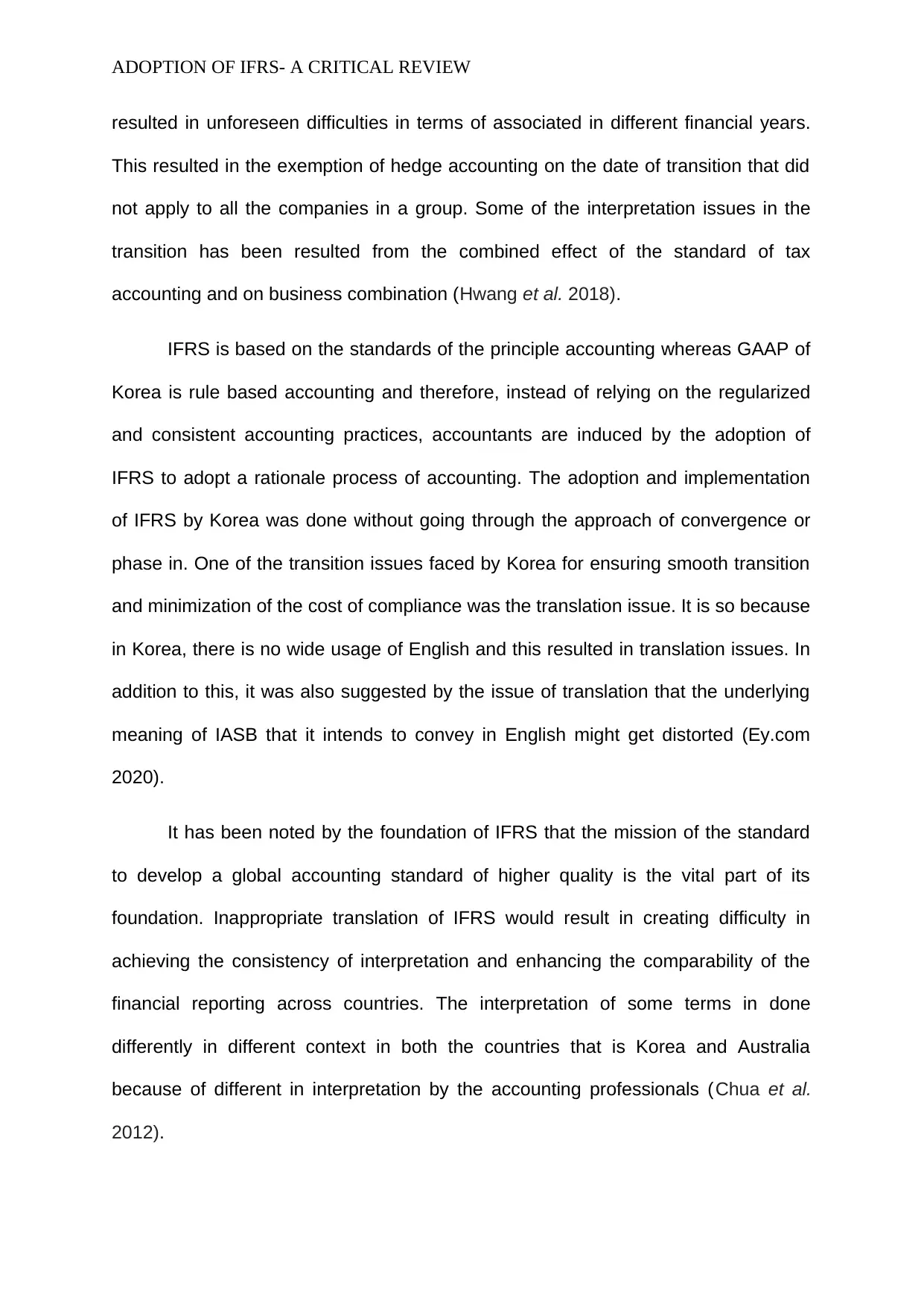
ADOPTION OF IFRS- A CRITICAL REVIEW
resulted in unforeseen difficulties in terms of associated in different financial years.
This resulted in the exemption of hedge accounting on the date of transition that did
not apply to all the companies in a group. Some of the interpretation issues in the
transition has been resulted from the combined effect of the standard of tax
accounting and on business combination (Hwang et al. 2018).
IFRS is based on the standards of the principle accounting whereas GAAP of
Korea is rule based accounting and therefore, instead of relying on the regularized
and consistent accounting practices, accountants are induced by the adoption of
IFRS to adopt a rationale process of accounting. The adoption and implementation
of IFRS by Korea was done without going through the approach of convergence or
phase in. One of the transition issues faced by Korea for ensuring smooth transition
and minimization of the cost of compliance was the translation issue. It is so because
in Korea, there is no wide usage of English and this resulted in translation issues. In
addition to this, it was also suggested by the issue of translation that the underlying
meaning of IASB that it intends to convey in English might get distorted (Ey.com
2020).
It has been noted by the foundation of IFRS that the mission of the standard
to develop a global accounting standard of higher quality is the vital part of its
foundation. Inappropriate translation of IFRS would result in creating difficulty in
achieving the consistency of interpretation and enhancing the comparability of the
financial reporting across countries. The interpretation of some terms in done
differently in different context in both the countries that is Korea and Australia
because of different in interpretation by the accounting professionals (Chua et al.
2012).
resulted in unforeseen difficulties in terms of associated in different financial years.
This resulted in the exemption of hedge accounting on the date of transition that did
not apply to all the companies in a group. Some of the interpretation issues in the
transition has been resulted from the combined effect of the standard of tax
accounting and on business combination (Hwang et al. 2018).
IFRS is based on the standards of the principle accounting whereas GAAP of
Korea is rule based accounting and therefore, instead of relying on the regularized
and consistent accounting practices, accountants are induced by the adoption of
IFRS to adopt a rationale process of accounting. The adoption and implementation
of IFRS by Korea was done without going through the approach of convergence or
phase in. One of the transition issues faced by Korea for ensuring smooth transition
and minimization of the cost of compliance was the translation issue. It is so because
in Korea, there is no wide usage of English and this resulted in translation issues. In
addition to this, it was also suggested by the issue of translation that the underlying
meaning of IASB that it intends to convey in English might get distorted (Ey.com
2020).
It has been noted by the foundation of IFRS that the mission of the standard
to develop a global accounting standard of higher quality is the vital part of its
foundation. Inappropriate translation of IFRS would result in creating difficulty in
achieving the consistency of interpretation and enhancing the comparability of the
financial reporting across countries. The interpretation of some terms in done
differently in different context in both the countries that is Korea and Australia
because of different in interpretation by the accounting professionals (Chua et al.
2012).
⊘ This is a preview!⊘
Do you want full access?
Subscribe today to unlock all pages.

Trusted by 1+ million students worldwide
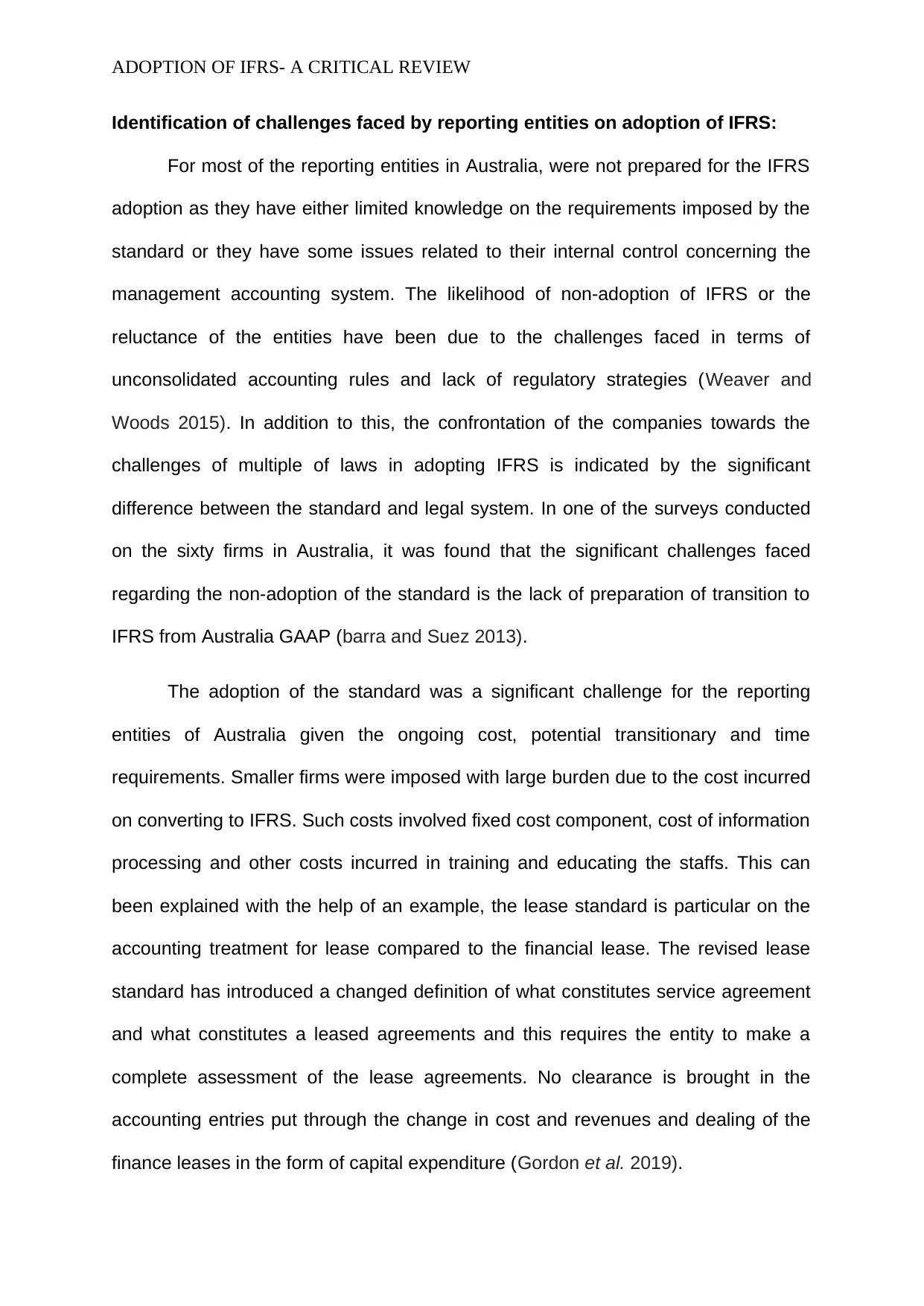
ADOPTION OF IFRS- A CRITICAL REVIEW
Identification of challenges faced by reporting entities on adoption of IFRS:
For most of the reporting entities in Australia, were not prepared for the IFRS
adoption as they have either limited knowledge on the requirements imposed by the
standard or they have some issues related to their internal control concerning the
management accounting system. The likelihood of non-adoption of IFRS or the
reluctance of the entities have been due to the challenges faced in terms of
unconsolidated accounting rules and lack of regulatory strategies (Weaver and
Woods 2015). In addition to this, the confrontation of the companies towards the
challenges of multiple of laws in adopting IFRS is indicated by the significant
difference between the standard and legal system. In one of the surveys conducted
on the sixty firms in Australia, it was found that the significant challenges faced
regarding the non-adoption of the standard is the lack of preparation of transition to
IFRS from Australia GAAP (barra and Suez 2013).
The adoption of the standard was a significant challenge for the reporting
entities of Australia given the ongoing cost, potential transitionary and time
requirements. Smaller firms were imposed with large burden due to the cost incurred
on converting to IFRS. Such costs involved fixed cost component, cost of information
processing and other costs incurred in training and educating the staffs. This can
been explained with the help of an example, the lease standard is particular on the
accounting treatment for lease compared to the financial lease. The revised lease
standard has introduced a changed definition of what constitutes service agreement
and what constitutes a leased agreements and this requires the entity to make a
complete assessment of the lease agreements. No clearance is brought in the
accounting entries put through the change in cost and revenues and dealing of the
finance leases in the form of capital expenditure (Gordon et al. 2019).
Identification of challenges faced by reporting entities on adoption of IFRS:
For most of the reporting entities in Australia, were not prepared for the IFRS
adoption as they have either limited knowledge on the requirements imposed by the
standard or they have some issues related to their internal control concerning the
management accounting system. The likelihood of non-adoption of IFRS or the
reluctance of the entities have been due to the challenges faced in terms of
unconsolidated accounting rules and lack of regulatory strategies (Weaver and
Woods 2015). In addition to this, the confrontation of the companies towards the
challenges of multiple of laws in adopting IFRS is indicated by the significant
difference between the standard and legal system. In one of the surveys conducted
on the sixty firms in Australia, it was found that the significant challenges faced
regarding the non-adoption of the standard is the lack of preparation of transition to
IFRS from Australia GAAP (barra and Suez 2013).
The adoption of the standard was a significant challenge for the reporting
entities of Australia given the ongoing cost, potential transitionary and time
requirements. Smaller firms were imposed with large burden due to the cost incurred
on converting to IFRS. Such costs involved fixed cost component, cost of information
processing and other costs incurred in training and educating the staffs. This can
been explained with the help of an example, the lease standard is particular on the
accounting treatment for lease compared to the financial lease. The revised lease
standard has introduced a changed definition of what constitutes service agreement
and what constitutes a leased agreements and this requires the entity to make a
complete assessment of the lease agreements. No clearance is brought in the
accounting entries put through the change in cost and revenues and dealing of the
finance leases in the form of capital expenditure (Gordon et al. 2019).
Paraphrase This Document
Need a fresh take? Get an instant paraphrase of this document with our AI Paraphraser
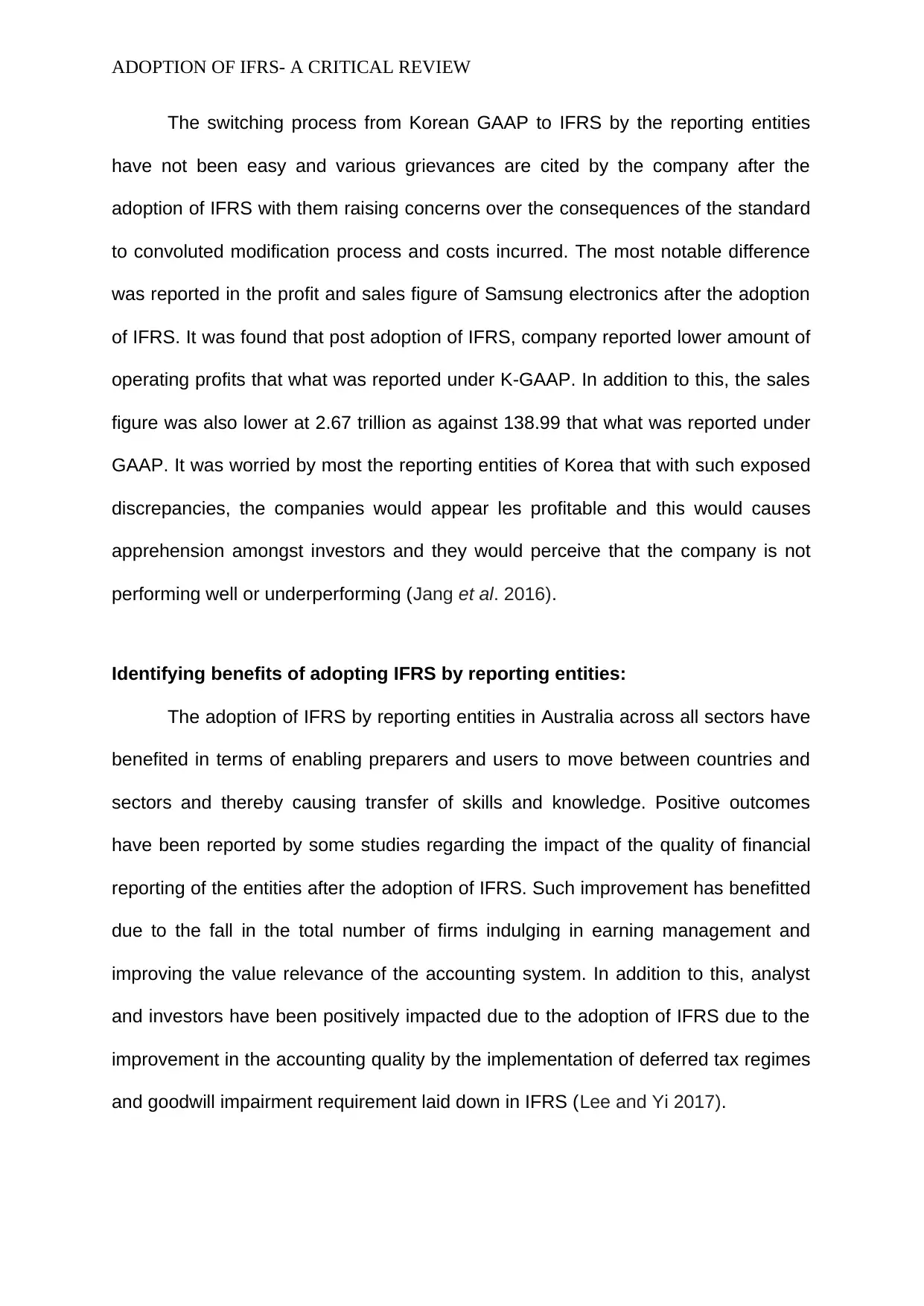
ADOPTION OF IFRS- A CRITICAL REVIEW
The switching process from Korean GAAP to IFRS by the reporting entities
have not been easy and various grievances are cited by the company after the
adoption of IFRS with them raising concerns over the consequences of the standard
to convoluted modification process and costs incurred. The most notable difference
was reported in the profit and sales figure of Samsung electronics after the adoption
of IFRS. It was found that post adoption of IFRS, company reported lower amount of
operating profits that what was reported under K-GAAP. In addition to this, the sales
figure was also lower at 2.67 trillion as against 138.99 that what was reported under
GAAP. It was worried by most the reporting entities of Korea that with such exposed
discrepancies, the companies would appear les profitable and this would causes
apprehension amongst investors and they would perceive that the company is not
performing well or underperforming (Jang et al. 2016).
Identifying benefits of adopting IFRS by reporting entities:
The adoption of IFRS by reporting entities in Australia across all sectors have
benefited in terms of enabling preparers and users to move between countries and
sectors and thereby causing transfer of skills and knowledge. Positive outcomes
have been reported by some studies regarding the impact of the quality of financial
reporting of the entities after the adoption of IFRS. Such improvement has benefitted
due to the fall in the total number of firms indulging in earning management and
improving the value relevance of the accounting system. In addition to this, analyst
and investors have been positively impacted due to the adoption of IFRS due to the
improvement in the accounting quality by the implementation of deferred tax regimes
and goodwill impairment requirement laid down in IFRS (Lee and Yi 2017).
The switching process from Korean GAAP to IFRS by the reporting entities
have not been easy and various grievances are cited by the company after the
adoption of IFRS with them raising concerns over the consequences of the standard
to convoluted modification process and costs incurred. The most notable difference
was reported in the profit and sales figure of Samsung electronics after the adoption
of IFRS. It was found that post adoption of IFRS, company reported lower amount of
operating profits that what was reported under K-GAAP. In addition to this, the sales
figure was also lower at 2.67 trillion as against 138.99 that what was reported under
GAAP. It was worried by most the reporting entities of Korea that with such exposed
discrepancies, the companies would appear les profitable and this would causes
apprehension amongst investors and they would perceive that the company is not
performing well or underperforming (Jang et al. 2016).
Identifying benefits of adopting IFRS by reporting entities:
The adoption of IFRS by reporting entities in Australia across all sectors have
benefited in terms of enabling preparers and users to move between countries and
sectors and thereby causing transfer of skills and knowledge. Positive outcomes
have been reported by some studies regarding the impact of the quality of financial
reporting of the entities after the adoption of IFRS. Such improvement has benefitted
due to the fall in the total number of firms indulging in earning management and
improving the value relevance of the accounting system. In addition to this, analyst
and investors have been positively impacted due to the adoption of IFRS due to the
improvement in the accounting quality by the implementation of deferred tax regimes
and goodwill impairment requirement laid down in IFRS (Lee and Yi 2017).
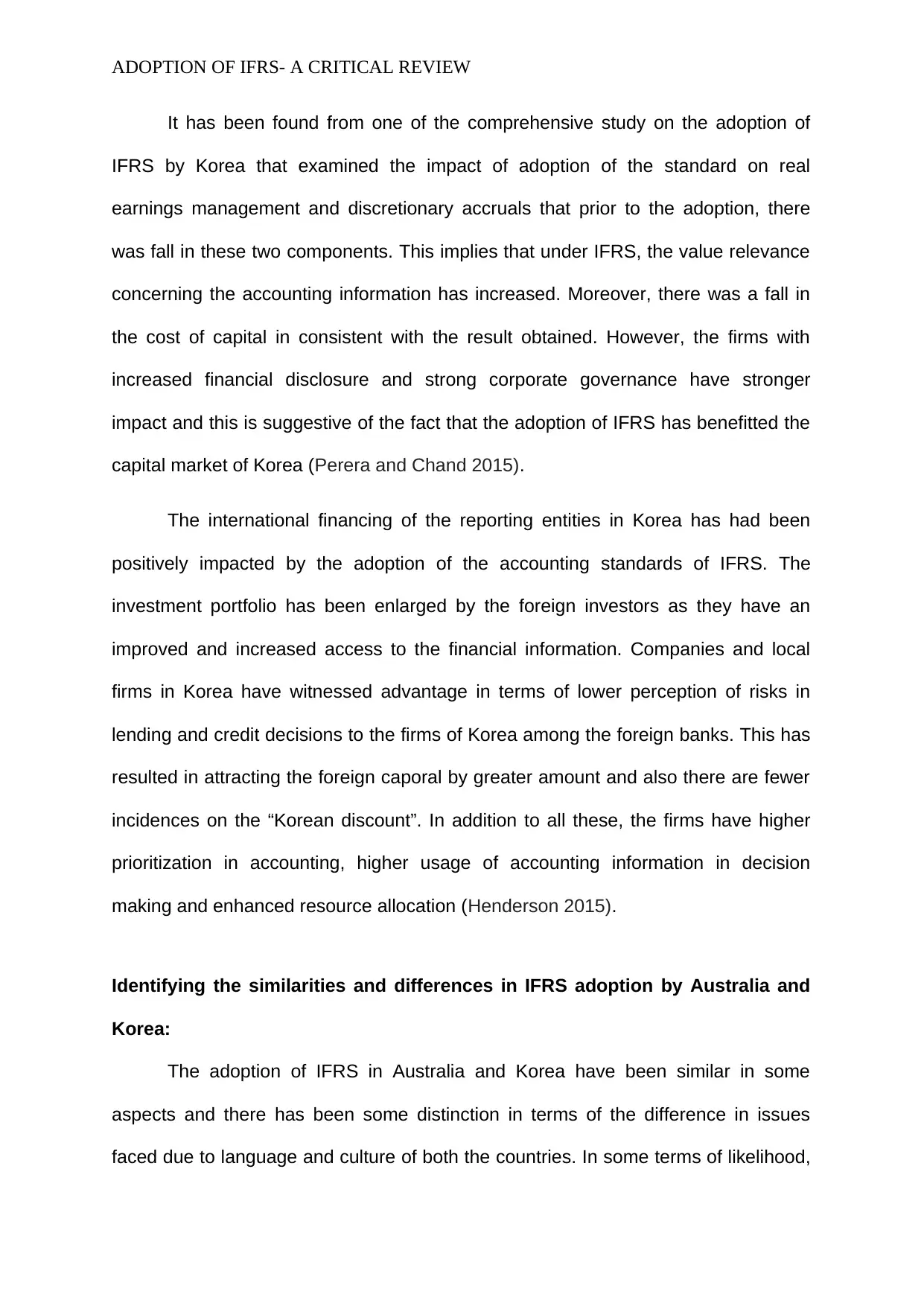
ADOPTION OF IFRS- A CRITICAL REVIEW
It has been found from one of the comprehensive study on the adoption of
IFRS by Korea that examined the impact of adoption of the standard on real
earnings management and discretionary accruals that prior to the adoption, there
was fall in these two components. This implies that under IFRS, the value relevance
concerning the accounting information has increased. Moreover, there was a fall in
the cost of capital in consistent with the result obtained. However, the firms with
increased financial disclosure and strong corporate governance have stronger
impact and this is suggestive of the fact that the adoption of IFRS has benefitted the
capital market of Korea (Perera and Chand 2015).
The international financing of the reporting entities in Korea has had been
positively impacted by the adoption of the accounting standards of IFRS. The
investment portfolio has been enlarged by the foreign investors as they have an
improved and increased access to the financial information. Companies and local
firms in Korea have witnessed advantage in terms of lower perception of risks in
lending and credit decisions to the firms of Korea among the foreign banks. This has
resulted in attracting the foreign caporal by greater amount and also there are fewer
incidences on the “Korean discount”. In addition to all these, the firms have higher
prioritization in accounting, higher usage of accounting information in decision
making and enhanced resource allocation (Henderson 2015).
Identifying the similarities and differences in IFRS adoption by Australia and
Korea:
The adoption of IFRS in Australia and Korea have been similar in some
aspects and there has been some distinction in terms of the difference in issues
faced due to language and culture of both the countries. In some terms of likelihood,
It has been found from one of the comprehensive study on the adoption of
IFRS by Korea that examined the impact of adoption of the standard on real
earnings management and discretionary accruals that prior to the adoption, there
was fall in these two components. This implies that under IFRS, the value relevance
concerning the accounting information has increased. Moreover, there was a fall in
the cost of capital in consistent with the result obtained. However, the firms with
increased financial disclosure and strong corporate governance have stronger
impact and this is suggestive of the fact that the adoption of IFRS has benefitted the
capital market of Korea (Perera and Chand 2015).
The international financing of the reporting entities in Korea has had been
positively impacted by the adoption of the accounting standards of IFRS. The
investment portfolio has been enlarged by the foreign investors as they have an
improved and increased access to the financial information. Companies and local
firms in Korea have witnessed advantage in terms of lower perception of risks in
lending and credit decisions to the firms of Korea among the foreign banks. This has
resulted in attracting the foreign caporal by greater amount and also there are fewer
incidences on the “Korean discount”. In addition to all these, the firms have higher
prioritization in accounting, higher usage of accounting information in decision
making and enhanced resource allocation (Henderson 2015).
Identifying the similarities and differences in IFRS adoption by Australia and
Korea:
The adoption of IFRS in Australia and Korea have been similar in some
aspects and there has been some distinction in terms of the difference in issues
faced due to language and culture of both the countries. In some terms of likelihood,
⊘ This is a preview!⊘
Do you want full access?
Subscribe today to unlock all pages.

Trusted by 1+ million students worldwide
1 out of 18
Related Documents
Your All-in-One AI-Powered Toolkit for Academic Success.
+13062052269
info@desklib.com
Available 24*7 on WhatsApp / Email
![[object Object]](/_next/static/media/star-bottom.7253800d.svg)
Unlock your academic potential
Copyright © 2020–2026 A2Z Services. All Rights Reserved. Developed and managed by ZUCOL.





